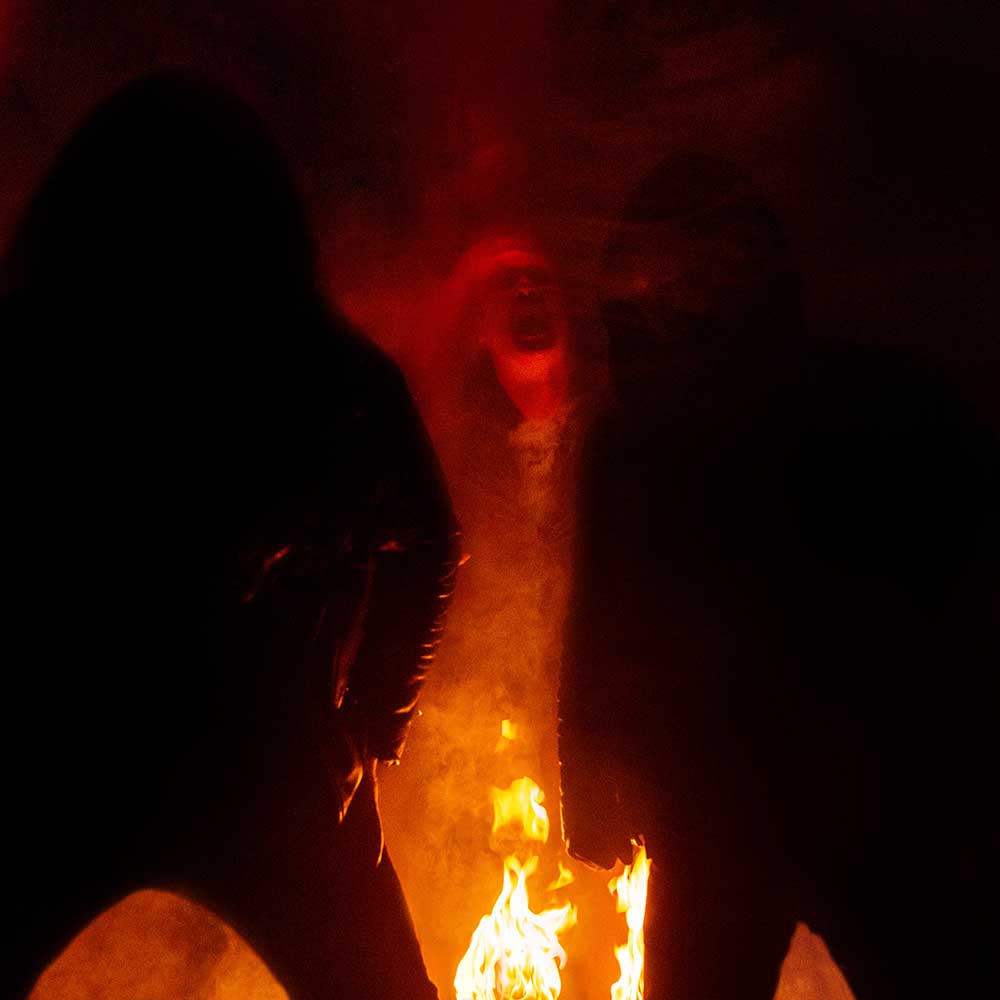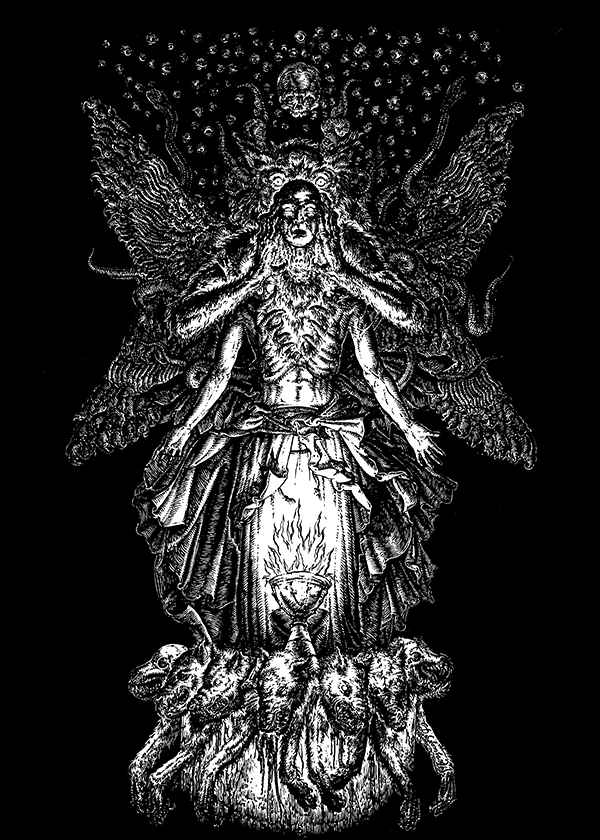Lvcifyre
2021-09-07
by Niklas Göransson
Heralds of pestilence – from the bowels of disease comes The Broken Seal, an abomination of the foulest death metal sorcery. T Kaos of Lvcifyre speaks of the past that shaped his present.
– Recording “The Broken Seal” in northern Italy, at precisely that point in time, made perfect sense to us. Panic was already widespread as the whole city went into lockdown. It did boost our egos, knowing this record was forged in the ‘mouth of the lion’, so to speak, and that the pestilence began with harvest. I’d like to think we were there for a purpose. We felt as if the new album was an opening ceremony for the plague.
“The Broken Seal” was recorded in Milan’s SPVN Studio in early 2020; it will be released September 10, 2021, by Dark Descent Records and NoEvDia. When I spoke to T Kaos prior to the interview, he described the new album as ‘the biggest mountain to climb thus far’ – adding that it took him seven years of creative toiling.
– I do feel that “The Broken Seal” was strongly cathartic. It’s usually around album number three that a band defines themselves and their style; and even if this entails technical regression, there is always room for improvement. For the time being, I have explored all the horizons I’ve been craving… certain emotions which smother the light and summon shadows. Perhaps the barrier between worlds is thinner than ever? Only small glimpses can be revealed from the subconscious. I’ve always thought of it as a god-like power that drives me forward in destructive mode – granting a taste or showing me what lies beyond. I felt like a wild dog trying to reach a horizon constructed by my own mind. The vision comes from within, as it was always meant to. Such is the reason why I was even born: to deliver and manifest Them in this form and no other.
Was the album written in parallel to your 2019 EP, “Sacrament”, or were they separate processes?
– We paused our work on the album only once the “Sacrament” recording drew close. So, in the end, they were written in parallel. “The Greater Curse” was initially meant to be the opening song for “The Broken Seal”, but we eventually came to see it in a different light. The rest then fell into place naturally. “Sacrament” was a strange flight until the very end – more of a dream-like state with a slight difficulty in telling wakefulness from slumber. The moniker ‘lucid death metal’ would fit just right here. That EP gives me the same feeling every time I hear it, which is a rare occurrence. The story itself speaks of a wandering soul that loses touch with mortal existence and can no longer tell what is real.

The lyrics for “The Broken Seal” contain quite a few references to a great deal of different mystical beings – recognisable from the Abrahamitic creeds, Zoroastrianism, and even Lovecraft’s Cthulhu mythos. However, I have been unable to find a recurring theme; “Sacrament” was a concept album, but this does not seem to be the case here.
– You’re right – no concept this time, just separate story lines. Of course, the entities mentioned therein are archetypes of the forces that break the stagnation of fossilised systems: ones which brings forth the darker gnosis of creation and uncreation. Such dynamics shall keep us sober, sever us from the false reality, and draw a clear line between us and the lambs. I knew what the lyrics would sound like before I’d even written them; it was clear in my mind which parts would contain vocals and which would be instrumental. It was primarily a matter of unlocking those patterns within ourselves. Once this was achieved, the rest went by smoothly.
The production on the new album has a similar feeling and depth as “Sacrament”, even though it was recorded in a different studio.
– You know, the engineer always knows better what you should sound like… right? Your job is to prove him wrong. We worked with Stefano Santi from SPVN Studio this time and our collaboration ran entirely without disturbances. Stefano is also our live engineer, which made us feel very comfortable. But there is no recipe for the LVCIFYRE sound per se; each time we end up in a studio, we allow the production to take its own route. Therefore, planning in advance is a pointless exercise. On “The Broken Seal”, we were leaning more towards the natural approach – no compression, with a heavy focus on maintaining dynamics. As for the guitars, I like them harsh and nasty with a minimal amount of overdrive or distortion. That’s when they really come to life: it’s a sonic texture you can almost touch.
I’d started wondering if T had given up on his semi-clean vocals – but then I was assailed by the closing part of the title track, which contains some demented chanting tastefully accompanied by a peculiar noise I think comes from a guitar.
– Indeed, that came out rather nicely. I put a lot of effort into many musical elements before the recording session, such as taking private lessons from a vocal coach; this allowed me to bring my voice into unbroken ground. Of course, I have a constant aspiration – or hunger – to try new things. And yes, that intrusive melody was done with guitars.
When it comes to atmosphere-dependant parts such as the aforementioned – are they typically conceived in the studio, or did you know beforehand that you’d be able to attain something similar?
– The majority of our atmospheric parts reveal themselves during the recording process: I love this raw matter that’s formed into howling gates. I guess every serious musician appreciates opportunities where they can unlock their potential. All songs undergo a gruelling pre-production process; I’ve worked that way ever since “The Calling Depths”. If you are the main composer, that is the only way to remember and capture everything in desirable form. When the music becomes as complex as LVCIFYRE‘s, you must be able to strip it apart and work on each section separately.
But you still play through the material together before recording it?
– Of course, all songs are properly rehearsed prior to recording. I need to see how they perform live, what the pulse is like, and whether they flow as expected or if there are any energy blockages somewhere. I’m sure many musicians prefer the old-school way, where all material is created collaboratively at rehearsal… but you know what? I’ve been writing music for close to thirty years now; I’ve tried it all, and this method works the best for me.

T Kaos is originally from Gdynia in the north of Poland. Back during the mid-90s, he played in a black metal band called HÖDUR. I recently did an interview with another Polish scene veteran – from the other side of the country – who mentioned that there was a ‘scene war’ between the southern and northern parts of the country. Bands like GRAVELAND, INFERNUM, VELES, and FULLMOON on one end, and acts like SACRILEGIUM and BEHEMOTH on the other. He said there was a general consensus in the south that northerners were only ‘talking and making nice riffs’.
– I’m contradicting this theory fully! We had a rather small but brutal unit up in the north: every weekend alcoholocaust was turning into fight mode or some other manner of desecration. We never stuck with BEHEMOTH or SACRILEGIUM and our riffs were certainly not ‘nice’. On the contrary – even underground ‘zines declined to publish reviews of our demo due to its harsh sound.
So, you were not involved in the dispute?
– Not at all. There were no problems from our side, we were on good terms with the south. I do recall some rumours concerning them taking issue with a few individuals who were swapping Satan for Svantovit or other pagan idols and then back again. However – unless I’ve missed something – nothing serious ever happened, so take all this with a grain of salt. There is always plenty of talk; all black metal bands want to present themselves as dangerous. When a style of music requires taking a certain stand, then it is quite easy to exaggerate your own ability. Perhaps we should count the number of lives claimed by this conflict? At a young age, the concept of hate is way easier to grasp than esoteric understandings about who we are and why we dwell here. In adolescence, you obviously react differently and take a more savage approach, which is understandable. However, in the law of progress, you should see things from different perspectives.
Around the turn of the millennium, T exchanged his domestic scene for a very different one. After his new band SONS OF SERPENT fell apart, he decided to leave Poland and move to London.
– By then, I’d given up on trying to find companions in my city who took this music seriously – I was in dire need of a change of scenery. A few months after my arrival in the UK, I met a couple of guys who were deeply involved with dark ambient, noise, and ritual music. We all ended up moving into the same house, where we built a small studio setup and rehearsal space in the living room. I had composed neither black nor death metal for several years at this point, and now found myself exploring new musical landscapes through deep collective unconscious and trance-like states. As the many concepts of sonic ritual were revealed to me, this serious and solemn attitude towards music solidified. I now use the same approach for anything I sink my teeth into.
T first got his feet wet in metal again by joining London’s finest, ADORIOR, in 2004. Three years later, he founded the first band of his own since SONS OF SERPENT: LVCIFYRE. It’s interesting to note that – despite having been deeply entrenched in 90s black metal – he had now gravitated towards death metal.
– There were no outspoken intentions of changing styles; rather, it was the result of honest writing without over-projecting what the material should sound like. I find them very similar to each other, and both are heralds of dark origins. I would see no point in writing either a death or black metal song without first creating an underlying spiritual entity, or something leading to it. Satanic metal of any kind, performed as a sonic weapon with full sinister intention, can generate vibrations that infect the sensitive astral substance. Violence and suicide are common results of submitting to these soundscapes of distorted entities, which are entirely demonic and destructive. Therefore, I’ve always considered these self-proclaimed ‘death metal’ bands who preach about modern-world political or animal rights and interventionist problems as nothing but – in the timeless words of Euronymous – ‘hardcore pigs’.
While there have been side projects such as DEATH LIKE MASS and SODALITY, my impression is that LVCIFYRE is the band T has plied his heart and soul into since its conception.
– Yes, LVCIFYRE – the unavoidable event written in my destiny – receives my undivided attention. It has also become my lifestyle, where there are tasks related to it almost every day. I’d like to treat it as an entity: even if it’s only a projection of my mind, it still makes more sense to me. Everything I have experienced in life, whether they were the harsh black metal 90s or those dark ambient sessions, shaped my approach to writing; all of it played a meaningful role in forging LVCIFYRE‘s servitors.



